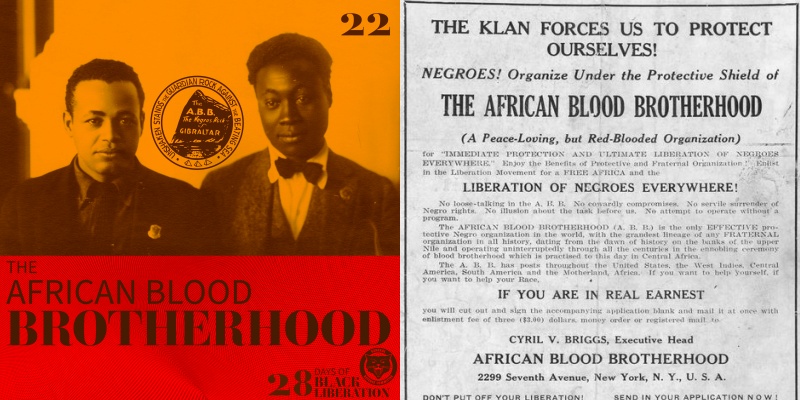Day 22 of the 28 Days of Black Liberation 2024 series
The African Blood Brotherhood for African Liberation and Redemption (ABB) was a militant black liberation group that was formulated in 1919 by Marxist journalist and Afro-Caribbean American Cyril Briggs, who wrote for The Crusader; a newspaper started out of the pan-African nationalist group the League of Legends. While working for The Crusader, Briggs regularly published articles connecting the plight of black workers to impoverished white immigrant workers in America and advocated for a common action between workers of all races, arguing that capitalism was the root cause of all struggle.
During the “Red Summer” of 1919, a summer of tumultuous violence, racist attacks, and lynchings of black communities, The Crusader called for the necessity of armed self defense as well as for a separate organization of African Americans to defend against racist attacks – thus prompting the formulation of the African Blood Brotherhood. The goal of the ABB was to unite black leftists and allow them to fight against racism, capitalism, and colonialism all on the basis of black nationalism all while establishing racial and class consciousness. The ABB gained notoriety in 1921 after the Tulsa Riot, where the branch there was linked to organizing armed resistance among black locals to fight back against the racist attacks.
The African Blood Brotherhood operated on a framework of both direct action and propaganda, armed with the gun and the pen, and using The Crusader as its main platform. The ABB’s membership included some of the most influential black radicals in the early 20th century, including Cyril Briggs, Richard B. Moore, and Grace Campbell. In the early 1920s, the ABB cooperated heavily with the Communist Party, with members within the ABB such as Claude McKay pushing for the Communist Party to take a stronger stance on the struggle of black workers. In order to be united under a single party, the ABB was later dissolved, and many of its members went on to join the Communist Party, the Workers Party of America, and the American Negro Labor Congress.
Learn more
The African Blood Brotherhood and the Origins of Black Communism in the United States
In the United States, the Black liberation struggle is the vanguard of the revolutionary class struggle. Black resistance to white supremacy has been the catalyst for nearly all critical social ruptures throughout american history. White workers choosing an alliance with the bosses instead of siding with the rest of the working class is the primary roadblock to revolutionary anti-capitalism in the US.
The GDC celebrates the Black liberation struggle and draws inspiration and lessons from its proud history in our struggle for the new world we are fighting for. In February we celebrate Black revolutionary culture, political prisoners, international figures and struggles, and moments in direct action that guide us in our continued, collective fight for liberation!

